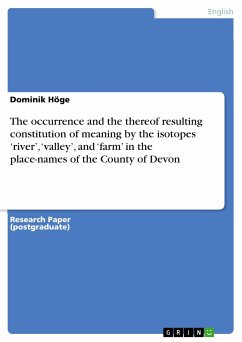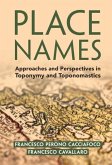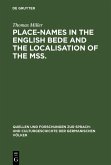Research Paper (postgraduate) from the year 2022 in the subject English Language and Literature Studies - Linguistics, University of Würzburg (Philosophisches Institut - Englische Sprachwissenschaft), course: Hauptseminar, language: English, abstract: Place-name research, or in other words called toponymy, within the field of onomastics, is one of the fastest growing domains in linguistics which brings new light and a different perspective to the study of language and words for which reason it has been subject to intense linguistic debates. In accordance with linguistic, historical, and geographical research matters, it investigates the etymology of city, town, field, and street names whose roles have always been to help identify and distinguish places from one another. Most settlement-names originated as descriptions that intended to identify individual places and to record information, for instance, about ownership or legal status. Subsequently, incorporating topographical elements in place-names has always been common practice, and according to Cole, these elements have been consistently applied throughout the history of English place-names. This is because all kinds of travellers, traders, kings with its courts, and people in general travelled across the world notwithstanding their illiteracy. Hence, written directions would have been of little use so that place-names were rather named after geographical entities (such as rivers, lakes, valleys, bays, or promontories) and towns or places within routes were named in the sense of "a list of places to pass through" (such as farms, farmsteads, farmlands, woodlands, or manufactures) so that travellers could go along this "list" to reach their destination.
Dieser Download kann aus rechtlichen Gründen nur mit Rechnungsadresse in A, B, BG, CY, CZ, D, DK, EW, E, FIN, F, GR, HR, H, IRL, I, LT, L, LR, M, NL, PL, P, R, S, SLO, SK ausgeliefert werden.
Hinweis: Dieser Artikel kann nur an eine deutsche Lieferadresse ausgeliefert werden.









